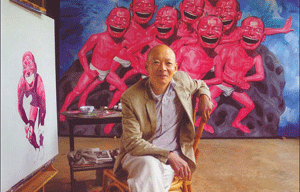Karen Millen buys back into China
Updated: 2011-10-17 22:09
By Cecily Liu (chinadaily.com.cn)
|
|||||||||
LONDON - A UK fashion brand bought back its rights to open stores in China this week after three years of complex negotiations with a Chinese investor.
Karen Millen plans to open 65 shops in the next five years, with the first ones in Beijing and Shanghai being completely company owned.
"We spent considerable time and money in retrieving our IP," Shaf Dewani, Managing Director of Karen Millen Australasian, told China Daily. Dewani will be overseeing the brand's China launch.
The company secured the rights for "tens of thousands" of pounds despite initially facing an asking price of £1m from the unnamed investor who also has rights to the names of many other major UK brands.
"We see this achievement as the catalyst to move quickly and enter what is the most exciting retail and consumer marketplace in the world," Dewani added.
David Roth, CEO of WPP The Store Global Retail Practice, said that many brands that entered China through franchise or joint venture models years ago are also now renegotiating deals.
"If global brands want to control their destiny in China, they need global control. Chinese partners may know the local environment better, but may not understand these brands' values," Roth said.
Just this June, US-based coffee retailing giant Starbucks Coffee Company acquired full ownership of all its stores in China from its joint venture partner Maxim's Caterers Ltd, ending an 11 year old partnership.
Yum! Brands, owner of KFC Pizza Hut and Taco Bell fast-food brands, offered to take its Chinese franchise partner Little Sheep Group in a private deal this May, after purchasing a 27.2% stake in 2009.
"But there is a difference between gaining financial control and maintaining a good team of local staff who understand Chinese culture and Chinese consumers," said Roth.
Tristan Rogers, chief executive of UK-based Concrete Group, a consultancy, said that competition in China's retail market for Western brands is still tough despite optimistic consumer numbers.
"The brands most likely to successfully expand into China are ones already with a mature presence around the world," Rogers said.
"It is common for growing Western brands to expand within Europe or to the Middle East initially, learning the lessons of expansion closer to home," Rogers added.
Karen Millen currently has 314 outlets in 40 countries and makes more money from its overseas business than in the UK.
Although the company will own some stores in China's tier one cities, Dewani said that expansion into China's tier 2-6 cities are more than likely to be done "in co-operation with an experienced and expert franchise partner".
Rogers commented: "This could be because legislative and financial risks for the retail sector in China's inland cities are still high. Franchise partnerships will divert some risks for Karen Millen while testing out new markets."
China's retail figures grew consistently despite the global downturn in recent years. According to a study from PriceWaterHouseCoopers, China overtook Japan as the world's second-largest retail market (after the United States) in 2009, with growth rates in 2010 and 2011 of 14.8% and 14% respectively.
Dewani said that as the Chinese mainland market establishes itself further, "the costs of retrieving intellectual property assets has, regrettably, the potential to rise."
But he hopes that the Chinese government's current support for foreign direct investment in other brand sensitive sectors such as fast moving consumer goods will in the future extend to the branded fashion and accessories sector.
Karen Millen has pitched itself as a "bridge" brand – offering a luxurious retail experience and accessible retail price point, competing with US names such as Michael Kors, DKNY and Tori Burch.
It so far has stores in Hong Kong and Macao. Its China launch will be accompanied by the introduction of a "completely new and exciting icon flagship design concept" tailored to the demand of modern and sophisticated Chinese woman, said Dewani.








